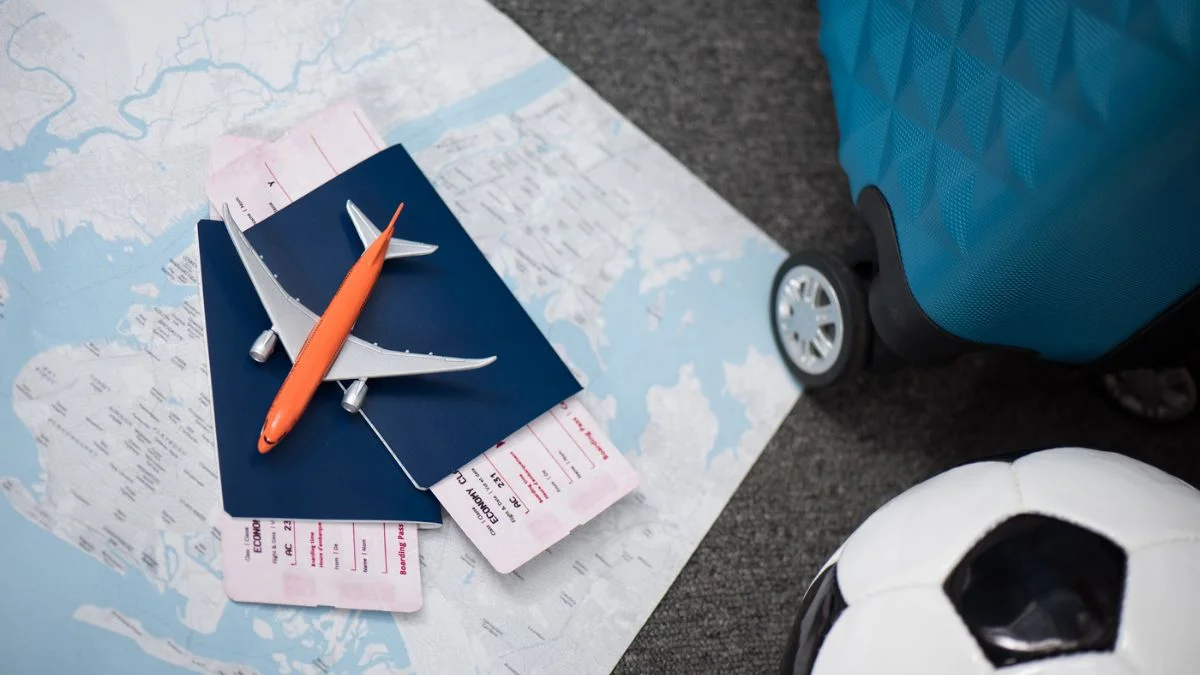Why Does My Plane Ticket Say ‘Seat Assigned at Gate’? Explained

As participants in Amazon Associates and other programs, we earn from qualifying purchases. This comes at no additional cost to you. For more details, see our Affiliate Disclosure.
Have you ever eagerly checked into your flight, only to see the phrase “Seat Assigned at Gate” in place of a specific seat number? It’s a term that many travelers come across but not everyone understands. In this article, we’ll unravel the mystery behind this common airline phrase and explain why you might not know where you’re sitting until just before boarding.
HIGHLIGHTS
- “Seat Assigned at Gate” is a common airline phrase resulting from overbooking, last-minute aircraft changes, and other operational reasons.
- Overbooking allows airlines to maximize revenue and compensate for anticipated no-show passengers, but can lead to passenger inconveniences.
- Travelers can enhance their chances of a favorable seat by arriving early, engaging politely with gate agents, and leveraging airline loyalty programs.
- Disadvantages for travelers include uncertainty, potential separation from travel groups, and the risk of denied boarding or unsuitable seating.
The Basics of Airline Seating
Airline seating is more than just choosing a window or aisle spot. It’s a blend of airline policies, aircraft layout, and passenger preferences.
While most passengers book a specific seat during ticket purchase or check-in, others might find their seats are determined closer to the flight time.
This intricate process is designed to optimize the airline’s efficiency and accommodate varying traveler needs.
Reasons for ‘Seat Assigned at Gate’
Sometimes, even after you’ve secured your flight ticket, you’re left without a specific seat until the last minute. This “Seat Assigned at Gate” situation arises from various operational and strategic choices made by airlines. Delving deeper into these reasons can help ease the uncertainty surrounding this phenomenon.
Overbooking: Airlines often sell more tickets than available seats on a flight, predicting that some passengers won’t show up. When everyone does turn up, they’ll need to manage seating arrangements at the gate.
Aircraft Changes: Last-minute switches in the type or size of the aircraft can lead to seating rearrangements. The new plane might have a different seating configuration, necessitating gate assignments.
Priority Seating: Elite or frequent flyer members may get seating preference. If they make late reservations or request changes, other passengers might be shuffled around to accommodate them.
Special Needs: Passengers with specific needs, such as those requiring wheelchair assistance or traveling with an infant, might be assigned seats at the gate to ensure their requirements are met.
Late Check-ins: If you’ve checked in closer to the flight’s departure, you may not be allocated a seat immediately, leading to gate assignments.
Operational Needs: Occasionally, weight and balance concerns on certain aircraft types can lead to specific seating assignments at the gate to ensure safe and efficient operation.
The Role of Overbooking in Airline Operations
Overbooking is a strategic decision made by airlines to maximize revenue and compensate for the anticipated no-show passengers. At its core, overbooking is based on statistical analyses and years of passenger behavior data.
Historical Data: Airlines have historical data showing a consistent percentage of passengers who miss their flights, cancel at the last minute, or change their travel plans. To ensure that planes fly as full as possible, they may sell more tickets than seats available based on these patterns.
Maximizing Profit: Empty seats represent lost revenue. By overbooking, airlines hedge against potential revenue loss from no-show passengers. When done correctly, the number of passengers that actually show up aligns closely with the number of available seats.
Compensations and Incentives: In situations where more passengers show up than there are seats available, airlines offer compensations. This might include vouchers for future flights, food, accommodations, or monetary compensation. These incentives often cost less than the potential revenue loss from flying with empty seats.
Dynamic Pricing: Overbooking allows airlines to employ dynamic pricing strategies. By understanding the demand and predicting no-show rates, airlines can adjust ticket prices to attract more bookings.
Operational Costs: Flying a plane with empty seats can be costlier per passenger than a full or overbooked one. Overbooking helps distribute the operational costs over a larger number of paying passengers, making each flight more economically efficient.
However, while overbooking has its advantages from a business perspective, it’s not without controversy. Passengers who are denied boarding due to overbooking can experience inconvenience and frustration, leading to potential negative publicity for the airline. As such, it’s a delicate balance that airlines must strike to ensure both profitability and customer satisfaction.
Benefits for Airlines and Some Passengers
Overbooking and gate seat assignments, while seemingly a logistical hiccup, can bring about certain advantages both for airlines and for some travelers. Here’s a breakdown:
For Airlines:
- Revenue Maximization: Overbooking ensures that planes fly with as few empty seats as possible, maximizing the revenue for each flight.
- Flexibility in Seating: Late adjustments can be made to accommodate VIP or frequent flyer passengers, ensuring customer loyalty.
- Reduced Operational Costs: A fuller flight means operational costs, like fuel and crew wages, are spread across more paying passengers, making the flight more cost-effective.
- Customer Retention: Offering compensations or perks for volunteers who give up their seats can foster goodwill and encourage future bookings.
For Some Passengers:
- Compensation Opportunities: Those willing to be flexible with their travel plans can benefit from airline compensations when flights are overbooked. This might include vouchers, meals, accommodations, or even cash.
- Upgrade Chances: In some cases, if economy class is overbooked but there’s space in a higher class, passengers might get a complimentary upgrade.
- Priority Seating for Loyalty Members: Frequent flyers or loyalty program members might benefit from the flexibility of gate assignments by receiving priority seating or last-minute adjustments that cater to their preferences.
- Ensured Special Assistance: Passengers with specific requirements—like those needing extra legroom or those with physical challenges—can be better catered to when seats are assigned at the gate.
While there are inherent advantages, it’s crucial for passengers to know their rights and be prepared for potential changes, ensuring a smoother travel experience.
Possible Disadvantages for Travelers
While airlines have their reasons for “Seat Assigned at Gate” policies and overbooking, passengers can sometimes face inconveniences as a result. Here are some potential drawbacks:
- Uncertainty and Anxiety: Not having a confirmed seat can cause stress for passengers, especially those who are on tight schedules or have connecting flights to catch.
- Separated Travel Groups: Families or groups traveling together may find themselves seated apart if they’re assigned seats at the gate, making the travel experience less pleasant.
- Missed Flights: In the worst-case scenario of a heavily overbooked flight, some passengers might be denied boarding altogether, leading to missed flights, events, or meetings.
- Compromised Seat Preference: Travelers have individual seating preferences—window, aisle, or specific rows for extra legroom. Gate assignments might not always align with these preferences.
- Extended Wait Times: If you’re waiting for a seat assignment, you might spend more time at the gate, leading to a longer and potentially more tiresome travel day.
- Compensation Limitations: While airlines do offer compensation for overbooked flights, it might not always be adequate or match the inconvenience faced by the passenger.
- Potential Extra Costs: If you’re bumped to a different flight or experience significant delays, you might incur additional expenses, like meals, accommodations, or transportation.
- Complex Rebooking: For those with connecting flights, a bump from one flight might lead to a domino effect, requiring multiple rebookings and adjustments to travel plans.
Travelers should be aware of these potential disadvantages and take proactive measures when they notice a “Seat Assigned at Gate” status, such as arriving early or clarifying their situation with airline representatives.
Tips for Getting the Best Seat When Assigned at Gate
When faced with the “Seat Assigned at Gate” status, a proactive approach can enhance your chances of securing a desirable seat. Here are some strategies to consider:
- Arrive Early: The sooner you’re at the gate, the better your chances of getting a favorable seat, especially before other gate-assigned passengers show up.
- Engage with Gate Agents: A polite conversation can go a long way. Approach gate agents with kindness, express your seat preferences, and ask about available options.
- Leverage Loyalty Programs: Being part of an airline’s frequent flyer or loyalty program can sometimes give you an edge when it comes to seat assignments.
- Specify Special Needs: If you have specific requirements—like extra legroom due to height or medical reasons—communicate this to the gate agents.
- Travel Light: Passengers with fewer carry-on items might be viewed as easier to accommodate, especially if overhead bin space is limited.
- Check Availability: Some airlines have apps that allow you to view current seat availability in real-time. Monitoring this can give you insights into potential seats.
- Stay Updated: Listen to announcements and stay near the gate. Sometimes, gate agents might call for volunteers willing to take a different flight in exchange for compensation. This could be an opportunity for those with flexible plans.
- Consider Upgrades: If the economy class is packed but there are seats available in business or first class, inquire about upgrade options. There might be last-minute deals or points redemption opportunities.
- Stay Calm and Flexible: Understand that gate agents are doing their best to accommodate everyone. A patient and understanding demeanor can make the process smoother for both you and the airline staff.
Armed with these tips, travelers can navigate the uncertainties of gate assignments with confidence and increase their chances of a favorable outcome.






